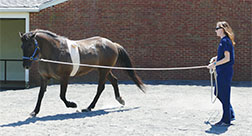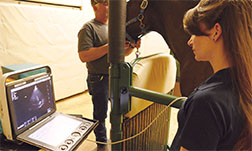 with Krista Estell, DVM, Diplomate ACVIM, Clinical Assistant Professor of Equine Medicine
with Krista Estell, DVM, Diplomate ACVIM, Clinical Assistant Professor of Equine Medicine
Sponsored Content – Poor performance in the equine athlete can be challenging to diagnose and manage. Suboptimal athletic performance may be caused by issues with cardiovascular fitness or disease. Advanced exercise diagnostics, including wireless heart rate monitors and ECG units, can be used while your horse is performing their normal athletic discipline to evaluate levels of fitness and detect exercise-related cardiovascular abnormalities.
Assessing your horse’s cardiovascular health is an important part of their annual veterinary exam. If your veterinarian has recently discovered a heart murmur or a cardiac arrhythmia, your horse should have an in-depth cardiac evaluation, including ultrasound of the heart (echocardiogram) and evaluation of the electrical conduction of the heart (ECG). An echocardiogram is useful in determining the cause of a heart murmur and allows objective assessment of the overall size and function of the heart. An ECG is necessary to definitively diagnose abnormal heart rhythms, which may be successfully treated. If you are with your horse and they suffer a cardiac arrest, they may want to look into Lifepak AED devices to keep on hand to get their hearts going again as a vet is being called. Check first with a vet to see if this is available.
Cardiovascular conditions can have a long-term impact on your horse’s overall performance and health. Decreased athletic performance and reduced stamina are common signs of cardiovascular disease. Horses with moderate to severe heart disease may even be considered too risky to ride, especially at high speeds or over jumps, because of the risk of sudden cardiac events. Regular assessment should be a priority as symptoms and severity can change over time. Heart disease in the horse may be more common than you may realize. Although many cases represent little or no problem to your horse and are easily managed, it is important to identify those heart conditions that could endanger the horse or the rider.
For further information about cardiovascular diagnostics available at the EMC, contact Kathy Ashland at 703-771-6875
(sponsored content; originally appeared in the June 2018 issue of The Equiery)

The Marion duPont Scott Equine Medical Center (EMC) is a premier, full-service equine health facility conveniently located at Morven Park in Leesburg, Virginia. As an integral part of the Virginia-Maryland College of Veterinary Medicine and Virginia Tech, the EMC offers an array of cutting-edge diagnostic and therapeutic technologies and veterinary expertise to provide innovative and cost-effective care for your horse. The EMC offers a broad range of general and advanced specialty services by appointment as well as comprehensive 24/7 emergency services. State of the art technology with cutting-edge expertise…
Serving you, your vet and your horse. Ask your vet about us, or visit us yourself!
703-771-6800 • www.vetmed.vt.edu/emc/
You’re Invited: Sign up (name and email address to emcinfo@vt.edu) for EMC’s free equine health alerts and notice of Tuesday Talks, a free, educational seminar series on topics of interest to the horse community. Like us on Facebook to stay informed about the latest advances in equine medicine and health.













